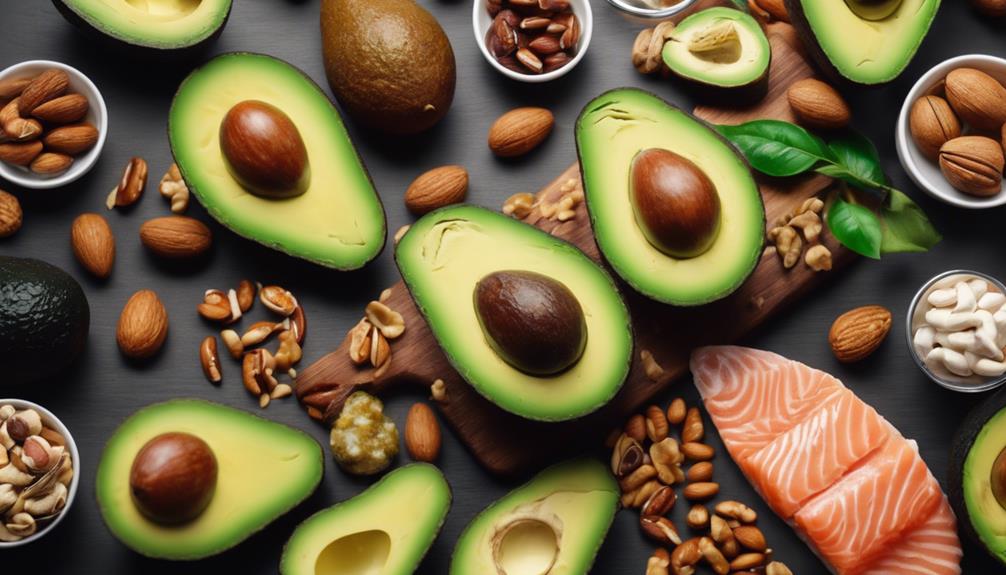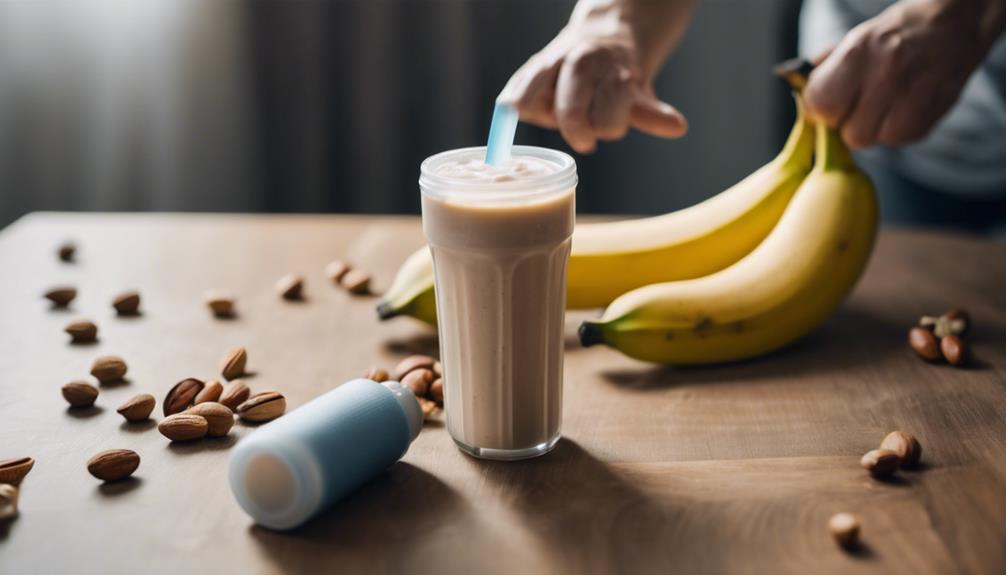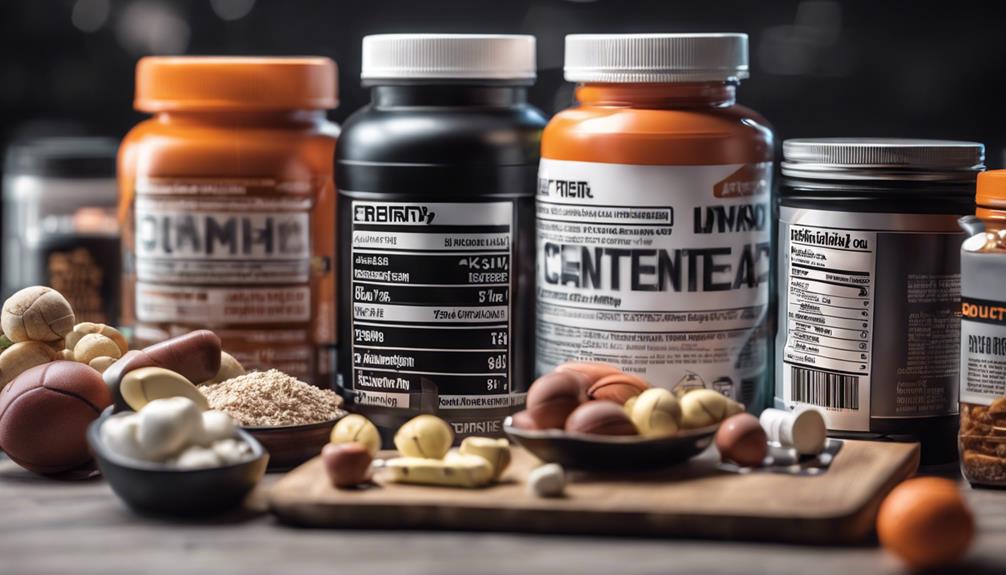How to Choose the Right Sports Nutrition
When faced with the overwhelming array of sports nutrition options, you might wonder how to select the right one for your needs. Understanding the intricacies of macronutrients, evaluating protein sources, and knowing the role of carbohydrates in performance are crucial steps.
But there's more to consider beyond these basics. Exploring the benefits of healthy fats, optimizing post-workout recovery nutrition, and selecting the right supplements can make a significant difference in your athletic performance.
Stay tuned to discover essential tips for tailoring your nutrition to suit your specific sport and goals.
Key Takeaways
- Optimize energy levels with proper sports nutrition strategies.
- Understand the importance of macronutrients for athletic performance.
- Evaluate protein sources for quality amino acid profiles.
- Tailor pre-workout and post-workout nutrition to specific sport demands.
Importance of Sports Nutrition
Understanding the crucial role that proper sports nutrition plays in enhancing athletic performance is essential for athletes striving to reach their full potential. Fueling strategies are the cornerstone of performance enhancement in sports. By consuming the right balance of nutrients at the appropriate times, athletes can optimize their energy levels, improve endurance, and enhance recovery.
Fueling strategies involve not only what you eat but also when you eat it. Pre-exercise nutrition is vital for providing the necessary energy to fuel your workout, while post-exercise nutrition plays a key role in replenishing glycogen stores and facilitating muscle repair. Hydration is another crucial aspect of sports nutrition, as even mild dehydration can impair performance.
To maximize your athletic performance, it's essential to develop a personalized sports nutrition plan tailored to your specific needs and goals. Consulting with a sports nutritionist can help you optimize your fueling strategies and make informed choices about your diet. Remember, proper sports nutrition isn't just about what you eat—it's about fueling your body for success.
Understanding Macronutrients
To optimize your athletic performance, it's crucial to grasp the significance of macronutrients in your diet. Macronutrients, including carbohydrates, proteins, and fats, play a vital role in fueling your body for exercise, aiding in recovery, and supporting overall health.
Here are three essential considerations when understanding macronutrients for sports nutrition:
- Caloric Needs: Understanding your caloric requirements is fundamental in ensuring you have enough energy to support your training and performance. Balancing the number of calories you consume with the calories you expend during exercise is key to maintaining optimal performance levels.
- Nutrient Timing: When you eat your macronutrients can significantly impact your athletic performance. Consuming the right balance of carbohydrates and protein before and after workouts can enhance energy levels, promote muscle recovery, and improve overall endurance.
- Proper Macronutrient Ratio: Finding the right balance of carbohydrates, proteins, and fats is essential for meeting your performance goals. Tailoring your macronutrient intake to fit your specific sport, training regimen, and body composition can help optimize your athletic performance and recovery.
Evaluating Protein Sources
Evaluating protein sources is crucial for optimizing your sports nutrition regimen and supporting your athletic performance. When evaluating the quality of protein sources, consider their amino acid profile, digestibility, and bioavailability.
Amino acids are the building blocks of protein, with nine considered essential as they must come from your diet. High-quality protein sources contain all essential amino acids in adequate amounts. Animal-based sources like chicken, fish, eggs, and dairy are complete proteins, providing all essential amino acids. Plant-based sources such as quinoa, soy, beans, and nuts can be combined to create complete protein profiles.
In addition to amino acids, consider the digestibility of protein sources. Whey protein, found in dairy products, is quickly digested and ideal for post-workout recovery. On the other hand, casein protein, also from dairy, is slower to digest and can be beneficial before bedtime.
Lastly, assess the bioavailability of protein sources, which refers to how well your body can absorb and utilize the protein. By evaluating these factors, you can choose protein sources that best support your athletic performance and overall health.
Role of Carbohydrates in Performance
Carbohydrates play a pivotal role in enhancing athletic performance by providing a vital source of energy for your body during exercise. Here are three key points to consider when it comes to carbohydrate fueling and performance optimization:
- Fuel for Intense Workouts: Carbohydrates are your body's preferred fuel source during high-intensity activities like sprinting or weightlifting. They're quickly converted into energy, allowing you to perform at your best when engaging in explosive movements.
- Sustained Endurance: For endurance activities like long-distance running or cycling, consuming carbohydrates before and during exercise can help maintain blood sugar levels and delay fatigue. This sustained energy release can improve your overall performance and stamina.
- Muscle Recovery: Carbohydrates play a crucial role in post-workout recovery by replenishing glycogen stores in your muscles. Consuming carbohydrates along with protein after exercise can enhance muscle recovery and promote muscle growth, ensuring you're ready for your next training session.
Benefits of Healthy Fats
Incorporating healthy fats into your diet can offer numerous benefits for your overall health and athletic performance. Cooking with oils rich in healthy fats such as olive oil, avocado oil, or coconut oil can provide essential nutrients and energy for your body. These healthy fats support hormone production, aid in the absorption of fat-soluble vitamins, and help reduce inflammation, which is crucial for recovery after intense physical activity.
Omega-3 fats, found in fatty fish like salmon, chia seeds, and walnuts, are particularly beneficial for athletes. Omega-3 benefits include reducing muscle soreness, improving joint flexibility, and supporting cardiovascular health. These fats also play a role in cognitive function, which can enhance focus and decision-making during training and competition.
Hydration and Electrolyte Balance
To optimize your athletic performance, maintaining proper hydration and electrolyte balance is essential. When engaging in physical activity, your body loses fluids through sweat, and electrolytes such as sodium and potassium are also depleted.
Here are three key strategies to help you stay hydrated and maintain electrolyte balance:
- Electrolyte Replenishment: Replacing lost electrolytes is crucial to prevent muscle cramps, maintain nerve function, and support hydration. Consuming electrolyte-rich foods like bananas, nuts, and leafy greens, or using electrolyte supplements, can help replenish these essential minerals.
- Hydration Strategies: Adequate fluid intake is vital for preventing dehydration and fueling performance. Drink water consistently throughout the day and increase your intake during exercise. Monitoring your urine color can be a simple way to assess your hydration status – aim for a pale yellow color as an indicator of proper hydration levels.
- Fueling Performance: Hydration and electrolyte balance are key factors in optimizing athletic performance. By staying properly hydrated and replenishing electrolytes, you can enhance endurance, maintain focus, and support overall physical well-being.
Timing Your Nutrition
Optimizing the timing of your nutritional intake can significantly impact your athletic performance and recovery. Meal timing plays a crucial role in maximizing performance. Consuming a balanced meal 2-3 hours before exercise provides your body with the necessary nutrients for sustained energy levels. This meal should consist of carbohydrates for fuel, lean proteins for muscle repair, and healthy fats for long-lasting energy.
Additionally, nutrient timing around workouts is essential for enhancing recovery and performance. Consuming a snack or a shake containing carbohydrates and protein within 30 minutes post-exercise can kickstart the recovery process by replenishing glycogen stores and initiating muscle repair.
Understanding the importance of timing your nutrition to support your training goals is key. Planning your meals and snacks strategically can help you maintain consistent energy levels throughout the day, optimize performance during workouts, and facilitate quicker recovery post-exercise. By paying attention to meal and nutrient timing, you can elevate your athletic performance and progress towards your fitness objectives.
Pre-Workout Fueling Strategies
Wondering how to best fuel your body before a workout to optimize your performance and recovery? To make the most of your pre-workout nutrition, consider the following strategies:
- Energy Balance: Ensure you strike a balance between the energy you consume and the energy you expend during your workout. Consuming a meal or snack that provides a mix of carbohydrates, proteins, and fats can help fuel your exercise and support muscle recovery.
- Nutrient Timing: Aim to consume a balanced meal or snack containing carbohydrates and protein around 2-3 hours before your workout. This timing allows your body to digest and absorb the nutrients effectively, providing you with the necessary energy to power through your exercise session.
- Hydration: Don't forget the importance of staying hydrated before your workout. Drink water throughout the day and consider consuming a pre-workout beverage that contains electrolytes to help maintain fluid balance and support optimal performance.
Post-Workout Recovery Nutrition
Consider implementing a well-rounded post-workout nutrition plan to enhance your recovery and maximize the benefits of your exercise session. Muscle repair and glycogen replenishment are crucial aspects of post-workout nutrition. Nutrient timing plays a key role in optimizing muscle recovery and growth. Consuming a combination of protein and carbohydrates within 30 minutes to an hour after your workout can enhance muscle protein synthesis and glycogen storage.
Recovery shakes can be convenient and effective in providing the necessary nutrients to support muscle repair and glycogen replenishment. These shakes often contain a mix of fast-digesting protein and high-glycemic carbohydrates to jumpstart the recovery process. Additionally, including whole foods like lean meats, fruits, and whole grains in your post-workout meal can further support muscle repair and glycogen replenishment.
Supplements for Athletes
To enhance your athletic performance and support your training goals, incorporating supplements tailored to your needs as an athlete can be beneficial. When considering supplement choices, it's crucial to align them with your specific performance requirements. Here are three key points to keep in mind for optimizing your supplementation:
- Identify Your Needs: Understand your individual athlete needs before selecting supplements. For example, endurance athletes may benefit from supplements that support cardiovascular health and stamina, while strength trainers might focus on muscle recovery and growth.
- Quality Over Quantity: Prioritize quality when choosing supplements. Look for products that are tested for purity, potency, and effectiveness to ensure you're investing in supplements that will truly support your performance goals.
- Consult with Professionals: Before introducing new supplements into your regimen, consider consulting with a sports nutritionist or healthcare provider. They can offer personalized advice based on your specific athletic needs and help you navigate the vast array of supplementation options available in the market.
Reading Nutrition Labels
Understanding how to read nutrition labels is essential for making informed choices about the food and beverages you consume. When analyzing the ingredients, focus on nutrient density and hidden sugars. Portion control plays a crucial role in managing your overall caloric intake. By deciphering nutrition labels, you empower yourself to tailor your diet to support your athletic performance effectively.
| Nutrition Label Tips | Description | Benefits |
|---|---|---|
| Ingredient Analysis | Scrutinize the ingredient list for whole foods and avoid products with excessive additives or preservatives. | Enhances the quality of nutrients consumed. |
| Portion Control | Pay attention to serving sizes to prevent overeating and track your calorie intake accurately. | Helps manage weight and optimize energy levels. |
| Nutrient Density | Choose foods rich in essential nutrients like vitamins, minerals, and antioxidants for overall health and performance. | Supports your body with vital fuel for optimal functioning. |
| Hidden Sugars | Beware of hidden sugars such as high-fructose corn syrup or various syrups that can add unnecessary calories. | Aids in maintaining stable blood sugar levels and preventing energy crashes. |
Tailoring Nutrition to Your Sport
Tailor your nutrition plan to match the specific demands of your sport to optimize performance and recovery. To make the most out of your athletic endeavors, consider the following:
- Sport-Specific Fueling: Different sports require different types of fuel. Endurance sports like marathon running might benefit from a carbohydrate-rich diet to sustain energy levels, while strength-based sports like weightlifting could benefit from a higher protein intake to support muscle growth and repair.
- Individualized Nutrition: Every athlete is unique, and what works for one person may not work for another. Consider factors such as your body composition, training intensity, and personal preferences when devising your nutrition plan. Consulting with a sports nutritionist can help tailor a plan that's specific to your needs.
- Timing Is Key: When and what you eat can significantly impact your performance. Pre-workout meals should focus on easily digestible carbohydrates and some protein, while post-workout nutrition should include protein for muscle repair and carbohydrates to replenish glycogen stores. Experiment with timing to find what works best for you and your sport.
Frequently Asked Questions
What Are Some Common Mistakes Athletes Make When It Comes to Sports Nutrition?
When it comes to sports nutrition, athletes often make mistakes by neglecting hydration balance and mistiming meals. Remember to stay hydrated throughout the day and fuel your body at the right times for optimal performance.
How Can an Athlete Determine Their Individual Caloric Needs for Optimal Performance?
To determine your individual caloric needs for optimal performance, start by tracking performance and adjusting based on results. Understand your macronutrient ratios for fueling correctly. Personalized needs are key for peak performance and reaching athletic goals.
Are There Any Specific Foods or Supplements That Can Help With Reducing Inflammation and Aiding in Recovery?
To reduce inflammation and aid recovery, focus on foods rich in antioxidants like berries, fatty fish for omega-3s, and turmeric for its anti-inflammatory properties. Supplements like collagen and tart cherry juice can also support your body's healing process.
How Does Sports Nutrition Differ for Endurance Athletes Versus Strength-Based Athletes?
In the world of sports nutrition, the fuel for endurance athletes is like a marathon, requiring sustained energy from carbs and timing protein intake. Strength-based athletes need fuel like a powerlifting session, focusing on protein for muscle repair and growth.
Can a Vegetarian or Vegan Diet Provide Adequate Nutrition for Athletes, and if So, What Are Some Key Considerations to Keep in Mind?
For athletes following a vegetarian or vegan diet, focus on plant-based protein sources, nutrient timing, hydration, and meeting micronutrient needs. Incorporate a variety of foods and consider supplements to ensure optimal performance and recovery.
Conclusion
So, now that you have a better understanding of sports nutrition, you may still be hesitant about making changes to your diet. But remember, fueling your body properly can significantly improve your athletic performance and overall health.
Start small by making simple changes to your nutrition plan and gradually build on that. Remember, every small step you take towards better nutrition will make a big difference in the long run.
Give it a try and see the results for yourself!













